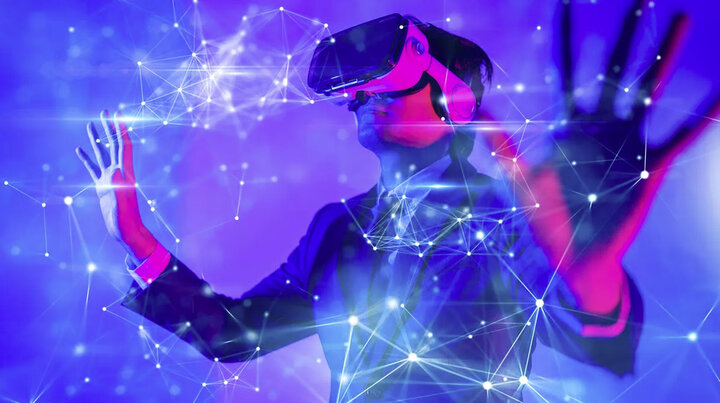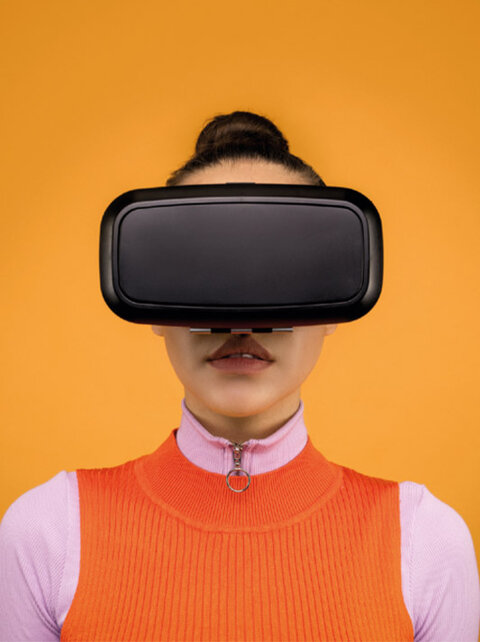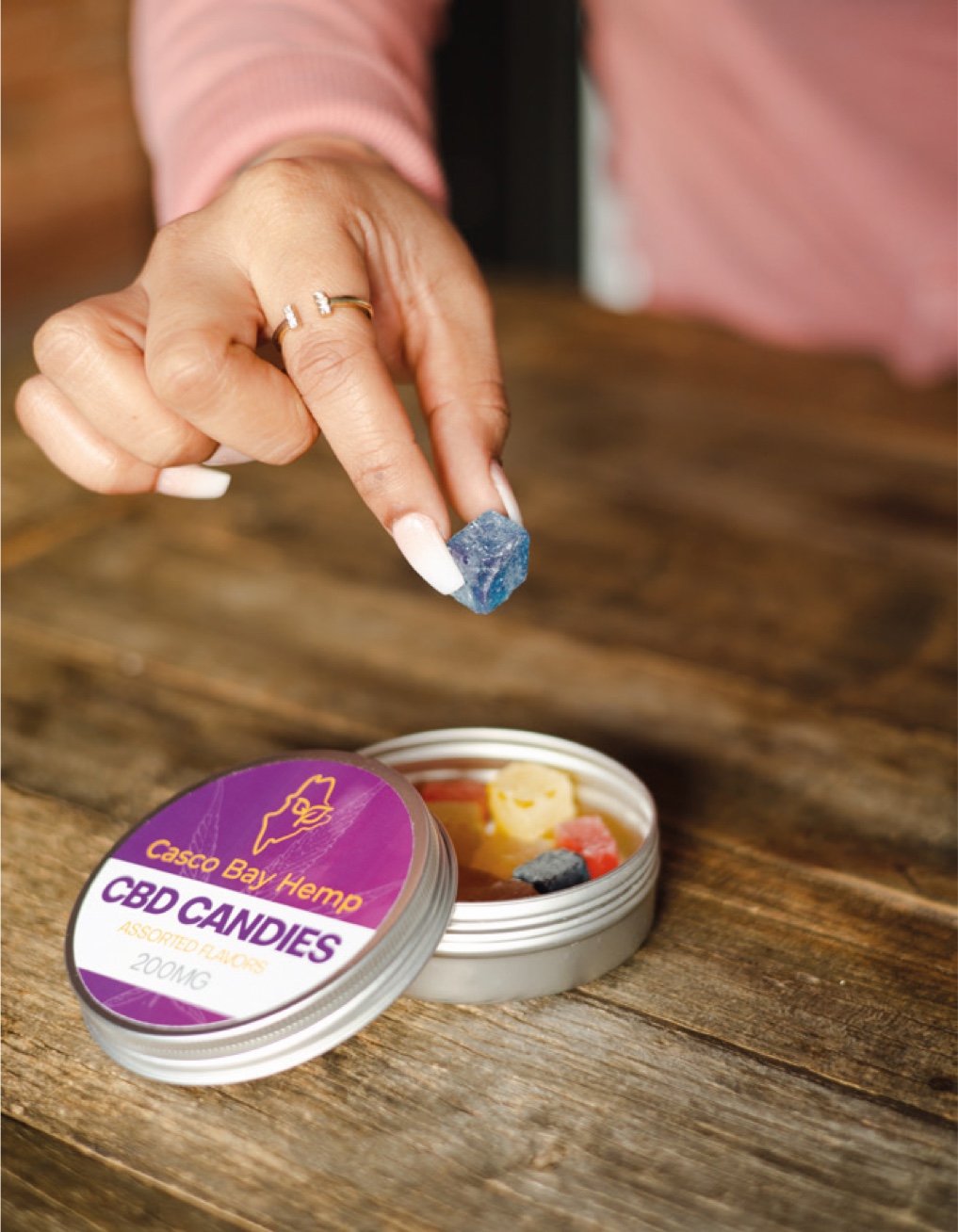COLUMN: CONSUMER PERSPECTIVE
Navigating the sensory gap
in metaverse personal care
KEYWORDS —
Abstract
Studies of major depressive disorder have been correlated with reduced Lactobacillus and Bifidobacteria and symptom severity has been correlated to changes in Firmicutes, Actinobacteria, and Bacteriodes. Gut microbiota that contain more butyrate producers have been correlated with improved quality of life (1).
A study in healthy women providing probiotic yogurt for four weeks showed an improvement in emotional responses as measured by brain scans (2). A subsequent study by Mohammadi et al. (3) investigated the impacts of probiotic yogurt and probiotic capsules over 6 weeks and found a significant improvement in depression-anxiety-stress scores in subjects taking the specific strains of probiotics contained in the yogurt or capsules. Other studies with probiotics have indicated improvements in depression scores, anxiety, postpartum depression and mood rating in an elderly population (4-7).
Other studies have indicated a benefit of probiotic supplementation in alleviating symptoms of stress. In particular, researchers have looked at stress in students as they prepared for exams, while also evaluating other health indicators such as flu and cold symptoms (1). In healthy people, there is an indication that probiotic supplementation may help to maintain memory function under conditions of acute stress.
“
“A study in healthy women providing probiotic yogurt for four weeks showed an improvement in emotional responses as measured by brain scans”
The metaverse, a term popularized by science fiction and now gaining real-world momentum, represents a convergence of virtual and physical realities (1). It is a digital universe where individuals can interact, socialize, work, and play through immersive technologies like augmented reality (AR), virtual reality (VR), and the internet. With its boundless potential, the metaverse is swiftly becoming a transformative force across diverse industries, from gaming and entertainment to education, healthcare, and commerce. As technology continues to advance, the metaverse’s influence is poised to reshape how we connect, communicate, and conduct business in ways previously only imagined in the realms of science fiction.
In the ever-expanding metaverse, personal care products and formulations are experiencing a remarkable ascent, marking a new frontier in the beauty and wellness industry. As virtual spaces become more integral to our daily lives, individuals are seeking ways to express their identities and enhance their self-care routines in digital realms. Metaverse users can now experiment with virtual skincare regimens, test makeup looks in immersive environments, and explore a universe of digital beauty options (2). This rise reflects the growing demand for innovative, customizable, and interactive personal care experiences, paving the way for a virtual beauty revolution that redefines how we perceive and engage with self-care in the digital age.
Despite the exciting advancements in metaverse personal care, a notable challenge persists: the absence of key sensory experiences, such as texture and smell, in virtual products. For consumers accustomed to the tactile sensations and fragrant delights of physical skincare and cosmetics, the digital landscape can sometimes feel like a sensory void. The inability to touch, feel, or smell virtual products can leave users with an undeniable disconnect, making it challenging to fully evaluate or connect with these digital counterparts. This sensory gap prompts important questions about how we perceive and engage with personal care in the metaverse and underscores the need for innovative solutions that can recreate these essential sensory dimensions.
The Sensory Gap: What are we missing?
In the realm of personal care products in the physical world, sensory experiences are paramount. Texture, scent, and tactile sensations are not mere luxuries but integral components of our daily rituals. The touch of a velvety moisturizer, the soothing aroma of a favorite lotion, or the refreshing crispness of a facial mist are sensory cues that elevate the act of self-care into a multisensory journey. These sensations not only delight the senses but also provide valuable information about product quality, effectiveness, and overall desirability. They forge a tangible and emotional connection between individuals and their chosen personal care items, turning routine tasks into moments of self-indulgence and self-expression. As we navigate the metaverse’s digital frontier, the challenge lies in replicating and enhancing these sensory dimensions to ensure that the essence of personal care remains intact.
The challenges consumers encounter when attempting to assess virtual products in the absence of tactile and olfactory sensations are both practical and emotional. In the physical world, touching a product helps us gauge its consistency, absorbency, or texture, while smelling it provides cues about its scent, freshness, and suitability for our preferences. Without these sensory cues in the metaverse, consumers may find it challenging to evaluate the quality and efficacy of virtual personal care items (3). This sensory gap can evoke a sense of uncertainty, making it difficult to confidently choose products or trust their effectiveness. Moreover, the inability to engage these senses can lead to a less immersive and emotionally disconnected experience, as the pleasure and reassurance derived from sensory engagement are absent, leaving users yearning for a more holistic and realistic virtual personal care encounter.
Can an artificial reality help?
Technologies such as augmented reality (AR) and virtual reality (VR) have emerged as powerful tools to bridge the sensory gap in the metaverse’s personal care landscape (4). AR overlays virtual elements onto the real world, allowing users to see and interact with virtual skincare or cosmetic products as if they were physically present. VR, on the other hand, immerses users in entirely virtual environments, where they can engage with products in three-dimensional spaces. These technologies enable consumers to virtually try on makeup, experiment with skincare routines, or explore fragrances in realistic and interactive simulations. Haptic feedback devices further enhance the experience by providing tactile sensations, allowing users to feel the texture of virtual products. Additionally, scent-emitting technologies are being developed to recreate the olfactory dimension, ensuring that the sensory richness of personal care is brought into the digital realm, making it increasingly possible for users to make informed decisions and enjoy a more immersive and multisensory virtual personal care experience.
Consumers’ reactions to these immersive experiences in the metaverse are marked by a blend of curiosity, enthusiasm, and growing expectations (5). Many are intrigued by the opportunity to experiment with personal care products in a novel and risk-free digital environment, allowing them to explore new looks, skincare routines, and beauty trends with ease. The convenience of virtual try-ons and the potential for personalized recommendations resonate positively with consumers seeking tailored solutions. As these immersive technologies become more sophisticated, users are increasingly embracing them, and early adopters often express excitement about the evolving possibilities. However, expectations are also rising, with consumers seeking ever more realistic sensory and interactive experiences. Brands that successfully meet these expectations are likely to see heightened consumer engagement and loyalty as users continue to explore and shape the metaverse’s beauty and personal care landscape.
Customization & Personalization
The metaverse holds immense potential for delivering customized and personalized personal care solutions that cater to individual needs like never before. Through the integration of AI algorithms and the analysis of user data, metaverse platforms can gain deep insights into a user’s skin type, concerns, and personal preferences. This wealth of information enables the creation of highly tailored product recommendations, skincare regimens, and makeup suggestions. For consumers, this means the ability to access expert-level advice and curated experiences, all within the virtual realm.
By harnessing the power of AI-driven personalization, metaverse personal care not only enhances user satisfaction but also paves the way for a new era of hyper-personalized self-care, where virtual products and routines align seamlessly with each individual’s unique needs and aspirations.
Innovations for a Virtual Sensory Space
Advancements in simulating scent and texture within the metaverse are opening up exciting possibilities for a more immersive personal care experience (6). Haptic feedback devices play a crucial role in replicating the tactile sensations of physical products. Users can feel the texture of virtual creams, powders, or skincare tools through these devices, enhancing the sense of touch in the digital world. Additionally, scent-emitting technologies are making strides in recreating the olfactory dimension of personal care. By diffusing virtual fragrances, users can engage their sense of smell, adding another layer of authenticity to their virtual beauty routines. These innovations bring a multisensory richness to metaverse personal care, helping users overcome the sensory disconnect and fostering a deeper connection with virtual products that is increasingly akin to their real-world counterparts.

Virtual Advantages for Formulators
One of the notable advantages of metaverse personal care is the agility it offers in responding to consumer feedback. In the digital landscape, metaverse brands can gather real-time feedback from users about their virtual products, formulations, and overall experiences. This instantaneous and direct communication channel empowers brands to make rapid iterations and improvements to their offerings. Whether it’s refining the texture of a virtual moisturizer or adjusting the efficacy of a skincare regimen, metaverse brands can swiftly adapt to consumer preferences and emerging trends. This dynamic responsiveness not only enhances user satisfaction but also fosters a sense of co-creation, where consumers actively influence and shape the development of personal care products in the metaverse, marking a new era of consumer-driven innovation.
Even further, in the metaverse, where users from around the world converge, it is paramount for personal care brands to consider diverse cultural preferences and sensitivities. Embracing cultural inclusivity not only promotes a more welcoming and respectful digital environment but also allows brands to reach a broader and more engaged audience. Brands can do this by recognizing and respecting the uniqueness of different beauty ideals and practices across cultures, ensuring that virtual products and experiences are reflective of this diversity. By actively involving individuals from various backgrounds and engaging in cross-cultural dialogue, brands can create a metaverse that celebrates beauty in all its forms, fostering a sense of belonging and acceptance for users, regardless of their cultural heritage or identity. Ultimately, it’s through this inclusive approach that metaverse personal care brands can truly connect with their global audience and cultivate a sense of unity in the digital beauty community.
The Future of Metaverse Personal Care
The future of sensory experiences in the metaverse is a tantalizing frontier poised for remarkable growth and innovation. As technology continues to advance, we can anticipate increasingly lifelike simulations of texture, scent, and other sensory elements, bringing us closer to replicating the tangible sensations of the physical world in the digital realm. Haptic feedback and scent-emitting technologies are likely to become even more sophisticated, offering a truly immersive multisensory experience. Furthermore, as metaverse personal care continues to evolve, it will further blur the lines between virtual and physical beauty, opening up exciting possibilities for customization, personalization, and holistic self-care. To fully embrace this transformative journey, we must stay engaged, explore, and actively participate in shaping the evolving metaverse landscape. As consumers and creators alike, our collective input and imagination will continue to drive the innovation that defines the future of sensory-rich personal care experiences in the metaverse.
The Future of Metaverse Personal Care
The future of sensory experiences in the metaverse is a tantalizing frontier poised for remarkable growth and innovation. As technology continues to advance, we can anticipate increasingly lifelike simulations of texture, scent, and other sensory elements, bringing us closer to replicating the tangible sensations of the physical world in the digital realm. Haptic feedback and scent-emitting technologies are likely to become even more sophisticated, offering a truly immersive multisensory experience. Furthermore, as metaverse personal care continues to evolve, it will further blur the lines between virtual and physical beauty, opening up exciting possibilities for customization, personalization, and holistic self-care. To fully embrace this transformative journey, we must stay engaged, explore, and actively participate in shaping the evolving metaverse landscape. As consumers and creators alike, our collective input and imagination will continue to drive the innovation that defines the future of sensory-rich personal care experiences in the metaverse.


Studies of major depressive disorder have been correlated with reduced Lactobacillus and Bifidobacteria and symptom severity has been correlated to changes in Firmicutes, Actinobacteria, and Bacteriodes. Gut microbiota that contain more butyrate producers have been correlated with improved quality of life (1).
A study in healthy women providing probiotic yogurt for four weeks showed an improvement in emotional responses as measured by brain scans (2). A subsequent study by Mohammadi et al. (3) investigated the impacts of probiotic yogurt and probiotic capsules over 6 weeks and found a significant improvement in depression-anxiety-stress scores in subjects taking the specific strains of probiotics contained in the yogurt or capsules. Other studies with probiotics have indicated improvements in depression scores, anxiety, postpartum depression and mood rating in an elderly population (4-7).
Other studies have indicated a benefit of probiotic supplementation in alleviating symptoms of stress. In particular, researchers have looked at stress in students as they prepared for exams, while also evaluating other health indicators such as flu and cold symptoms (1). In healthy people, there is an indication that probiotic supplementation may help to maintain memory function under conditions of acute stress.
References and notes
- Sparkes, M. (2021). What is a metaverse.
- Woo, J. H., & Kim, S. I. (2020). A study on User experience of Virtual Beauty Makeup Applications. Journal of Digital Convergence, 18(11), 459-464.
- Spence, C. (2022). Multisensory contributions to affective touch. Current Opinion in Behavioral Sciences, 43, 40-45.
- Crofton, E. C., Botinestean, C., Fenelon, M., & Gallagher, E. (2019). Potential applications for virtual and augmented reality technologies in sensory science. Innovative Food Science & Emerging Technologies, 56, 102178.
- Zhang, T., Wang, W. Y. C., Cao, L., & Wang, Y. (2019). The role of virtual try-on technology in online purchase decision from consumers’ aspect. Internet Research, 29(3), 529-551.
- Panagiotakopoulos, D., Marentakis, G., Metzitakos, R., Deliyannis, I., & Dedes, F. (2022). Digital scent technology: Toward the internet of senses and the metaverse. IT Professional, 24(3), 52-59.

